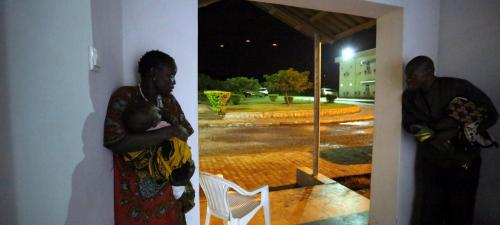Verdict against South Sudan soldiers ‘finally delivers justice’ – UN Mission
The United Nations Mission in South Sudan (UNMISS) has applauded the verdict by a military court on Thursday, that found ten government soldiers guilty of murder, rape and other crimes against civilians and journalists at a hotel in the capital Juba, just over two years ago.

Internally displaced persons slithering at a UN protection of civilians site in Juba, South Sudan, take cover as the compound comes under attack amidst heavy fighting between the SPLA and the SPLA-IO.
“The victims and survivors of this horrific attack deserved justice and that has been served today,” said UNMISS in a statement.
“The outcome of the trial also sends a powerful message to other would-be offenders, including members of the armed forces, that they will be prosecuted and punished for such violence,” it added.
It is the first time that soldiers have been sentenced for atrocity crimes in South Sudan, where government and rebel soldiers have been accused of committing numerous atrocities against civilians since civil conflict intensified in 2013.
The brutal assaults – which included the murder of a local journalist and rape of five foreign aid workers – occurred at the Terrain Hotel in July 2016, amidst heavy fighting between Government and rival forces which lasted three days and left dozens dead.
The judgement delivered early on Thursday, handed down lengthy prison terms to the guilty and also ordered the Government to pay damages to the victims.
However, according to evidence raised during the trial, “questions remain about whether accountability for these crimes reached high enough up the chain of command,” added UNMISS.
‘True courage’ of witnesses and survivors
In the statement, the UN Mission also commended the witnesses and survivors for demonstrating “true courage and patience” by participating in the judicial process, which began in May 2017.
“There were some significant challenges throughout the process, including the detention conditions of the defendants, some impediments to the defendants’ access to counsel, and the trial of these crimes against civilians in a military rather than civilian court,” it said.
However, the UN Mission noted, as the trial progressed, there was a willingness to adopt new procedures, including allowing testimony to be given via video link and using closed sessions to protect the identities of witnesses.
Widespread sexual and gender-based violence persists
The UN Mission also underscored that despite bringing to justice the offenders in one particular case, the “broader problem” of widespread sexual and gender-based violence against South Sudanese women and children, continues to fester.
The world’s youngest nation has remained mired in conflict and instability, with most cases of violence going unreported and there is widespread impunity across the country, added UNMISS.
2016 violence and the aftermath
The fighting between the Sudan People’s Liberation Army (SPLA) and the Sudan People’s Liberation Movement/Army in Opposition (SPLM/A-IO) in July 2016 saw dozens killed, with more than 200 reported rapes, and widespread looting and destruction of property.
UN compounds and UNMISS-managed civilian protection sites also came under attack. Two UN peacekeepers from the Chinese contingent were killed and several injured, and 182 buildings on the UN House compound were struck by bullets, mortars and rocket-propelled grenades.
An independent special investigation – commissioned by then Secretary-General Ban Ki-moon and led by retired Major General Patrick Cammaert of the Netherlands – found “a lack of leadership on the part of key senior Mission personnel had culminated in a chaotic and ineffective response to the violence.”
The investigation was unable to verify allegations that peacekeepers failed to respond to acts of violence committed directly in front of them.
In response to the report, the UN moved to enhance training as well as accountability, including working with Member States to bolster the protection of civilians by uniformed personnel in future peacekeeping operations.
Source:United Nations
- 353 reads
Human Rights
Ringing FOWPAL’s Peace Bell for the World:Nobel Peace Prize Laureates’ Visions and Actions

Protecting the World’s Cultural Diversity for a Sustainable Future

The Peace Bell Resonates at the 27th Eurasian Economic Summit

Declaration of World Day of the Power of Hope Endorsed by People in 158 Nations

Puppet Show I International Friendship Day 2020

